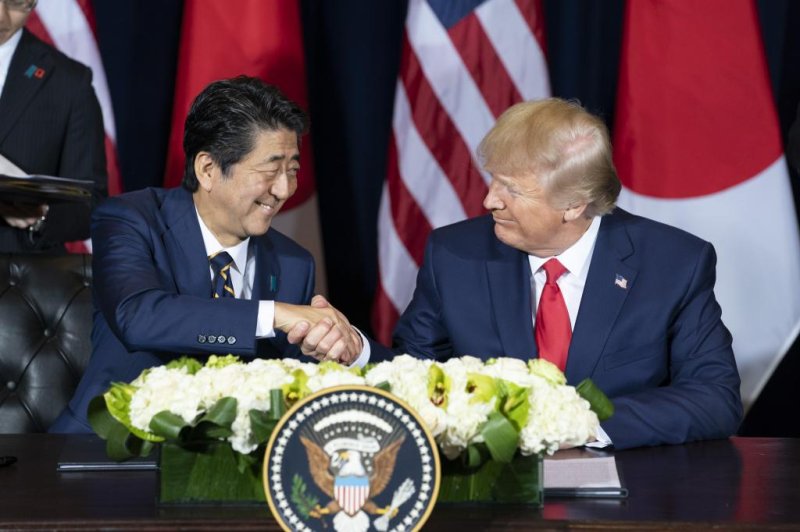Japanese Prime Minister Shinzo Abe and U.S. President Donald Trump signed two trade deals Wednesday on agriculture and digital goods. Official White House Photo by Joyce N. Boghosian
Sept. 25 (UPI) -- U.S. President Donald Trump and Japanese Prime Minister Shinzo Abe signed a limited trade pact Wednesday to lower or eliminate tariffs on imports of U.S. agricultural products and Japanese industrial goods while signing a second accord on digital trade.
Announced on the sidelines of the U.N. General Assembly in New York City, the trade deal will see over 90 percent of U.S. food and agricultural products imported into Japan either free of duties or given preferential tariff access. In return, the United States will either eliminate or reduce tariffs on Japanese agricultural imports, including persimmons, green tea and soy sauce valued at $40 million in 2018 and on specific industrial goods, such as machine tools, bicycles and musical instruments, among others.
Trump said the deal will open new Japanese markets to about $7 billion in U.S. agricultural products
"Japanese tariffs will now be significantly lower, or eliminated entirely, for U.S. beef, pork, wheat, cheese, wine and so much more," he said, describing the deal as a "huge victory" for U.S. agriculture workers.
Trump also said the deal will reduce the number of trade deficit agreements the United States has signed over the years with other countries, which has long been an issue for the president, who campaigned on erasing those lopsided agreements.
The agreement is viewed as a stepping stone toward achieving a comprehensive trade deal, which is being negotiated.
Abe said it was a "win-win solution" for both countries while remarking that the United States led a "very, very tough" negotiation process.
The deal does not include a reduction in auto and auto-part duties as Japan had been seeking, but it is expected to eliminate Trump's threat to impose a 25 percent tariff on its vehicle imports in November as a joint statement between the two countries states "both nations will refrain from taking measures against the spirit of theses agreements" while making "efforts for an early solution to other tariff-related issues."
The two countries also inked a $40 billion digital trade deal that includes banning duties on digital products transferred electronically such as videos, music, e-books and games while knocking down barriers to cross-border data transfers.
"This will greatly expand commerce across cutting-edge products and services," Trump said.
Abe said the two deals will develop both countries' economies and will "further galvanize the investment in the two sides" while deepening economic cooperation.
U.S. Trade Representative Robert Lighthizer told reporters that if implementation goes as planned, the effects of the agreements will begin Jan. 1.
"If we had not done this, the United States agriculture would be at a disadvantage to TPP countries and some European countries," he said, referring to the Trans-Pacific Partnership agreement. "This gets us equal or better [access] than those people."















